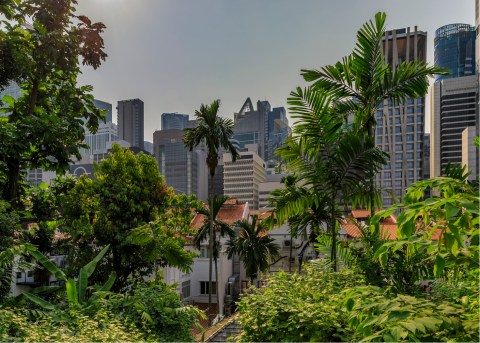Build a global team in minutes
Get expert helpThe good news: your hotshot programmer just finished their vacation in Singapore.
The bad news: they loved Singapore so much they want to stay there and work remotely.
If you want to keep them, you're going to have to dive into the treacherous waters of what it means to employ remote workers across borders.
On the plus side, we're talking Singapore here, so at least those waters are warm and crystal-blue. So there's that.
Visa basics
Singapore's numerous work visas cater to talent from various backgrounds, resulting in a strong expat community of highly skilled professionals that constitute roughly 29% of the country's population.
Anyone from students and tech professionals to individuals looking to start a venture-backed firm in Singapore has numerous visa options.
Singapore's highly skilled talent pool and strategic location in the heart of Southeast Asia make it a highly attractive target market for many global companies.
Types of Singapore work visas
Singapore offers numerous work visas, or work passes, to various talent, ranging from executive professionals to trainees and students.
Singapore work passes for professionals
This category includes three work passes for highly skilled professionals: Employment Pass, EntrePass, and Personalized Employment Pass.
Each is available for individuals in managerial or executive roles in a locally incorporated company or who are heads of their own Singaporean-based firm.
- Employment Pass (EP). The EP is a two-year work pass for individuals with a job offer in an executive role in a Singaporean-based company. In 2025, candidates must earn a monthly salary of at least S$5,000, or S$5,500 if they work in financial services. Tech professionals with skills that are in shortage may obtain an extended five-year EP.
- EntrePass. This one-year work pass is available to foreign entrepreneurs who plan to launch a Singapore business that has venture backing or already owns innovative technologies.
- Personalized Employment Pass. Similar to the Employment Pass but with greater flexibility, this three-year pass does not tie holders to an employer. In 2025, candidates must earn a fixed monthly salary of S$22,500 from abroad or while already working on an Employment Pass in Singapore.
- Overseas Networks & Expertise Pass (ONE Pass). This is an exclusive, five-year pass for top talent across multiple sectors, such as business, arts, sports, and academia, that allows its holders to work for multiple companies at one time. Candidates must earn S$30,000 per month or the equivalent in a foreign currency or have a job offer from an established Singaporean-based employer paying them S$30,000 per month.
Singapore work passes for skilled and semi-skilled talent
This category of Singapore work passes is available to skilled and semi-skilled professionals from various fields, including construction workers, nannies, and hotel performers.
Individuals from certain countries who work in select fields may qualify for one of the following Singapore work passes:
- S Pass. This two-year work pass is available to mid-level skilled talent who earn at least S$3,000 (US$2,256) per month and hold a degree from an accredited institution or have relevant work experience.
- Work Permit for migrant workers. This is a two-year work pass available to semi-skilled workers from select countries, such as India, the Philippines, and Taiwan, who work in construction, marine shipyard, manufacturing, processes, and services.
- Work Permit for migrant domestic workers . This two-year work pass is available to workers between the ages of 23 and 50 from select countries, such as Bangladesh, Indonesia, and the Philippines, who come to work in Singapore as family helpers.
- Work Permit for confinement nanny. This 16-week work pass is available to Malaysians between the ages of 23 and 70 who come to Singapore to care for a newborn during the first 16 weeks of the child's life.
- Work Permit for performing artist. This is a six-month, non-renewable work pass for performing artists aged 18 or older who work for eligible public entertainment outlets in Singapore, such as hotels or bars.
Singapore work passes for trainees and students
Work passes for trainees and students allow young professionals and students from select countries to visit Singapore for various training and professional internships in local companies or educational institutions.
This visa category includes three different work passes, outlined below:
- Training Employment Pass. Foreign nationals who come to Singapore to study at a select institution or train for a professional, executive, or specialist role in a local company and earn at least S$3,000 (US$2,256) per month may apply for this three-month pass.
- Work Holiday Pass. This is a non-renewable, six-month work pass available to international students aged 18 to 25 from countries participating in the Working Holiday Programme. A similar program exclusively for Australians called the Holiday Visa Programme, offers a one-year pass to individuals aged 18 to 30.
- Training Work Permit (TWP). This six-month work pass is for unskilled and semi-skilled employees from related overseas companies to undergo training at a local firm in Singapore.
Singapore short-term work passes
Singapore legislation outlines certain work activities that visitors can undertake without a work pass.
However, if it isn't on the list, foreign nationals may apply for a short-term work permit, or miscellaneous work pass, which allows visitors to take on temporary work in the country for less than 60 days. These passes are ideal for individuals like journalists and guest speakers.
Full-time students may also work jobs that contribute to their graduation requirements without obtaining a work pass or notifying the Ministry of Manpower.
How to get a Singapore work visa: 6 steps
Regardless of the pass you choose, the first step in obtaining a Singapore work visa is for the applicant to secure a job offer from a local company. From then on, the application process is primarily the employer's responsibility.
Keep in mind that overseas employers without a presence in Singapore must ask a third-party local entity, such as an employer of record (EOR) in Singapore, to act as a local sponsor and submit the application on their behalf.
Below, we outline the general steps required to apply for most Singapore work visas.
1. Employer applies for work visa online
Before the foreign employee may travel to Singapore, the employer or relevant third-party entity must lodge a work visa application and pay the processing fee through the online Employment Pass (EP) eService.
Fees range from S$35 to S$175 (US$26 to $131), depending on the work pass, and the company must provide its up-to-date business profile as registered with the Accounting and Corporate Regulatory Authority (ACRA).
2. Employer receives in-principal approval (IPA) letter
If approved, the employer should receive an In-Principle Approval (IPA) letter within three weeks.
3. Employee travels to Singapore with IPA letter
Upon receiving the IPA letter from their employer, the employee may travel to Singapore within six months (or 60 days for an S Pass).
4. Employer applies online for work visa issuance
The employee must be in Singapore before their employer can apply for the work pass. Once the employee arrives, the employer may apply via the online portal and pay the processing fee for the pass itself, which ranges from S$35 to S$225 (US$26 to $169).
Processing takes about seven days.
5. Employee receives issuance notification letter
If successful, the employer should receive a work pass approval letter, which includes critical information about whether or not the employee must get their photo and fingerprints taken at the Ministry of Manpower (MOM) Services Center.
This document is simply an approval letter. However, it permits the employee to start working and enter and exit the country as needed until they receive their employment pass card.
6. Employee registers at the Employment Pass Services Centre (EPSC)
The employment pass card serves as the official work pass. To receive it, all employees must register at the Employment Pass Services Centre (EPSC) within two weeks of receiving their approval letter.
It takes about four workdays to receive the card, at which point the work pass application process is complete.
Considerations before obtaining a Singapore work visa
A critical thing to remember is that every candidate seeking employment in Singapore must have visa sponsorship from a legally incorporated Singaporean entity. This law creates a serious challenge for global companies hiring foreign nationals in the country.
The simplest solution is to partner with an employer of record such as Pebl. An EOR is a third-party organization that serves as the legal employer of your global workforce. The EOR takes care of visa sponsorship and handles everything else from hiring and onboarding to payroll and compliance, allowing you to test the Singaporean market and quickly hire foreign nationals without violating local employment and immigration laws.
FAQs
How much does a work visa in Singapore cost?
The fees for Singapore work visas vary depending on the work pass you apply for.
For example, an application for a standard Singapore work visa, called an Employment Pass, incurs a S$105 (US$79) processing fee and a S$225 (US$169) issuance fee. Meanwhile, the processing and issuance fees for the Training Work Permit are only S$35 (US$26) each.
Also, employers who seek to hire foreign talent in Singapore are limited to a quota and must pay a foreign worker levy for each work visa holder they hire. The fee depends on the industry the company is in, the type of work visa their employees hold, and their employees' qualifications.
How long is a Singapore work visa valid?
Singapore work visa validities differ between work passes. For example, a standard Employment Pass is valid for two years for most holders. However, this increases to five years for tech professionals with skills that are in shortage.
Conversely, the short-term work pass is available for a maximum of 60 days.
Can work visa holders bring dependents to Singapore?
Employment Pass, S Pass, and ONE Pass holders may apply for a Dependant's Pass, which allows their spouses and children to join them in Singapore for up to two years.
A Dependant's Pass is available to the visa holder's legally married spouse and unmarried children under 21.
Ready to hire talent in Singapore?
Don't let the complexities of work authorization stop you from expanding-Singapore offers amazing opportunities, and companies that do the work will reap the rewards.
Why not make it easy with Pebl?
When you use the Employer of Record service, our expert team handles the burden of visa sponsorship, so you can relocate talent or hire foreign nationals in Singapore with peace of mind. We'll also handle payroll services, benefits administration, compliance, and just about everything else, leaving you with less headache and more time to visit the Gardens by the Bay.
Contact us to learn how easy global expansion can be when done the right way.
Topic:
Immigration + Relocation


